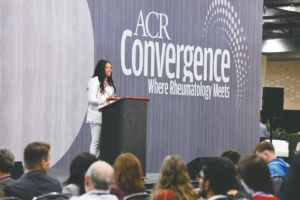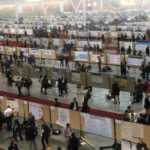 Early in the COVID-19 pandemic, scientific and medical conferences began to be canceled or postponed. Later, once the pandemic endured beyond the scope of weeks to months, many organizations shifted conferences to a virtual format. Now, as the federal government has ended the COVID-19 Public Health Emergency, effective mitigation measures, including vaccination, rapid testing, masking and air filtration, have again made it feasible for most scientists and physicians to attend in-person conferences. However, a newer hybrid conference format has arisen, allowing attendees to choose whether to participate in person or virtually.
Early in the COVID-19 pandemic, scientific and medical conferences began to be canceled or postponed. Later, once the pandemic endured beyond the scope of weeks to months, many organizations shifted conferences to a virtual format. Now, as the federal government has ended the COVID-19 Public Health Emergency, effective mitigation measures, including vaccination, rapid testing, masking and air filtration, have again made it feasible for most scientists and physicians to attend in-person conferences. However, a newer hybrid conference format has arisen, allowing attendees to choose whether to participate in person or virtually.
We discuss the benefits and pitfalls of hybrid conferences, with a focus on equity and inclusion—calling for the continued inclusion of a virtual platform and suggesting ways to optimize that aspect.
Benefits
Inclusion—Virtual options for conference participation improve inclusion of academic faculty and trainees with clinical care responsibilities who cannot travel, relieving tension between attendees and those providing coverage. Busy clinicians without protected conference time can benefit from on-demand access options.
Hybrid meetings enable inclusion of, and engagement with, clinicians in private or community practices who often face financial or logistical obstacles to national and international conference attendance. Virtual conference access provides self-paced academic updates for busy clinicians, which is particularly important for those in private practice—unconnected to academic institutions—who lack protected time for continuing medical education.
Hybrid conferences allow investigators who are parents/caregivers to attend virtually when necessary to meet family obligations. This is particularly pertinent for those in the early stages of their careers, when missing a fully in-person conference may mean missing critical networking opportunities, such as mentor-mentee meetings and subspecialty networking sessions.
Eliminating conference-related travel removes the cost and need for visas, improving accessibility for international attendees who often face long and uncertain visa delays. Sometimes the visa approval process depends on proof of invitation to present or speak at the conference. Even then, if the visa is not approved in time to arrange travel, would-be attendees may have to cancel altogether.
Finally, individuals who face health risks related to travel and/or large in-person gatherings, including clinicians and patients taking immunosuppressive medications, may continue to avoid in-person meetings. This will be a larger issue when community transmission levels of infectious diseases are high, especially as in-person conferences have de-emphasized transmission prevention measures like masking and spacing. A virtual option allows these groups to maintain engagement with the research community without incurring undue health risks. In particular, the inclusion of the patient and caregiver perspective is critical to our field, and providing options to protect their health is essential.

